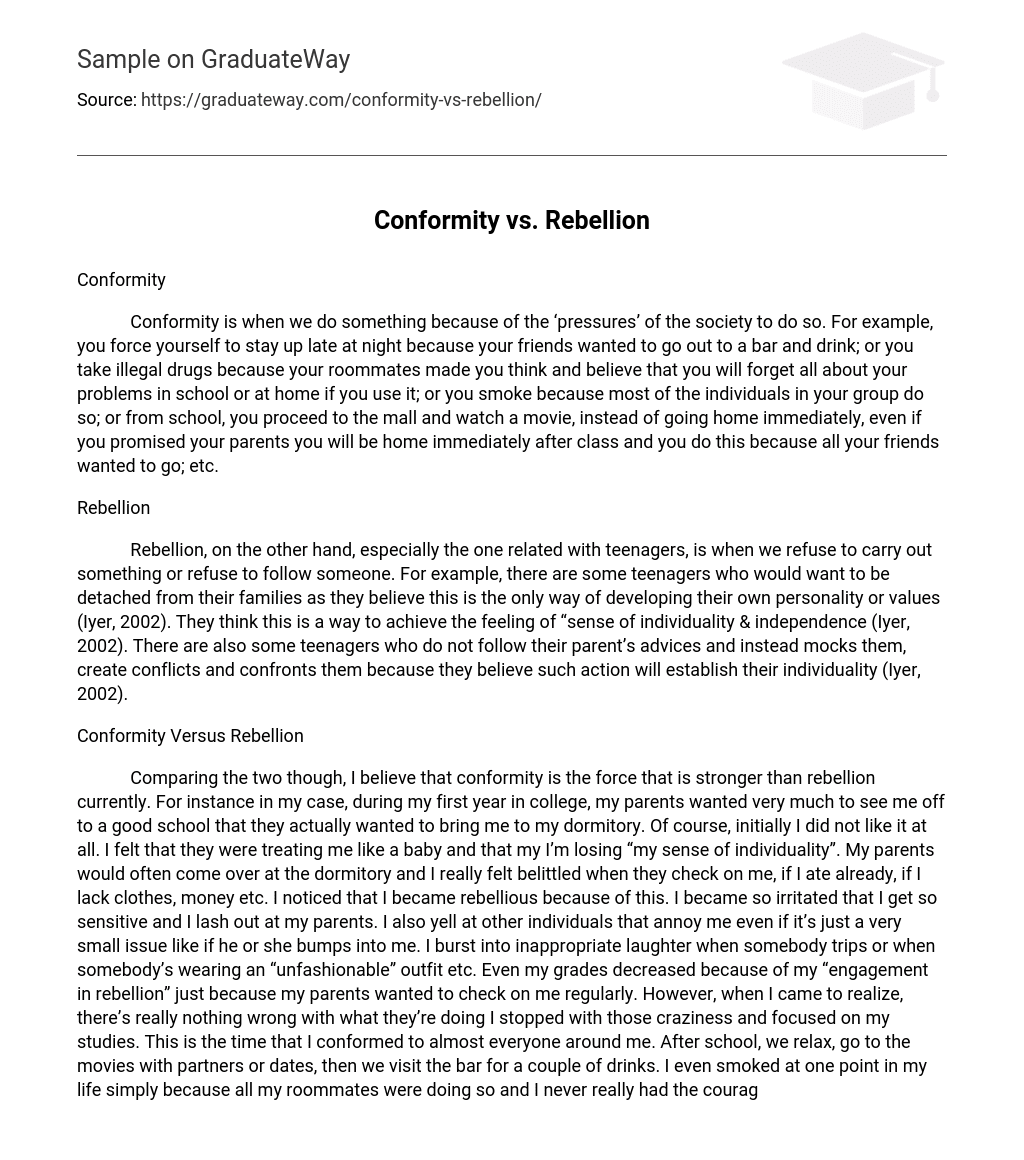Conformity
Conformity is when we do something because of the ‘pressures’ of the society to do so. For example, you force yourself to stay up late at night because your friends wanted to go out to a bar and drink; or you take illegal drugs because your roommates made you think and believe that you will forget all about your problems in school or at home if you use it; or you smoke because most of the individuals in your group do so; or from school, you proceed to the mall and watch a movie, instead of going home immediately, even if you promised your parents you will be home immediately after class and you do this because all your friends wanted to go; etc.
Rebellion
Rebellion, on the other hand, especially the one related with teenagers, is when we refuse to carry out something or refuse to follow someone. For example, there are some teenagers who would want to be detached from their families as they believe this is the only way of developing their own personality or values (Iyer, 2002). They think this is a way to achieve the feeling of “sense of individuality & independence (Iyer, 2002). There are also some teenagers who do not follow their parent’s advices and instead mocks them, create conflicts and confronts them because they believe such action will establish their individuality (Iyer, 2002).
Conformity Versus Rebellion
Comparing the two though, I believe that conformity is the force that is stronger than rebellion currently. For instance in my case, during my first year in college, my parents wanted very much to see me off to a good school that they actually wanted to bring me to my dormitory. Of course, initially I did not like it at all. I felt that they were treating me like a baby and that my I’m losing “my sense of individuality”. My parents would often come over at the dormitory and I really felt belittled when they check on me, if I ate already, if I lack clothes, money etc. I noticed that I became rebellious because of this. I became so irritated that I get so sensitive and I lash out at my parents. I also yell at other individuals that annoy me even if it’s just a very small issue like if he or she bumps into me. I burst into inappropriate laughter when somebody trips or when somebody’s wearing an “unfashionable” outfit etc. Even my grades decreased because of my “engagement in rebellion” just because my parents wanted to check on me regularly. However, when I came to realize, there’s really nothing wrong with what they’re doing I stopped with those craziness and focused on my studies. This is the time that I conformed to almost everyone around me. After school, we relax, go to the movies with partners or dates, then we visit the bar for a couple of drinks. I even smoked at one point in my life simply because all my roommates were doing so and I never really had the courage to turn down their offers. What’s good about my experience is that I did not only conform to actions which are more likely to bring about negative consequences, I also obliged myself to conform to those which bring about positive effects. For example, if my friends decide to proceed to the library and silently and seriously study there, I am also compelled to do so. If my roommates say they are not up to drinking for the night then I also would not go out and sleep early as well. If my friends audition for a varsity team or a particular role in an interesting play, I also get excited and I audition as well.
Another reason why I believe that conformity is the force that is stronger than rebellion currently is because if you notice, the reasons for conformity are: fear of being labeled “different/weird”; fear of feeling non-belongingness; fear of getting no support from other etc; fear of not having friends (Social.., n.d.). Meanwhile, some of the reasons for rebellion are: confusion/refusal of growing up; wanted to feel “sense of autonomy”; hormonal changes including sensitivity, and hot-temperedness etc (Social.., n.d.). There are more teenagers who are more concerned with the reasons for conformity as compared with teenagers who are hooked with the reasons for rebellion. This is why generally, conformity is the stronger force.
Last but not least, there are more teenagers who conform than rebel nowadays because of the fact that they would rather feel they belong, rather that keep their individuality and end up being alone. It is far more important to them because they would rather be with people rather than being different by becoming a rebel and fighting with someone. Besides, since rebellion among teenagers is largely influenced by hormonal change, then this is only a “passing phase” while conformity is not since it goes hand in hand with the teenage years. They would have to conform as long as they are surrounded by the society.
References
Iyer, A. (2002). Teenage Rebellion. Retrieved June 18, 2007 from
http://www.boloji.com/teens/articles/00312.htm
Social Conformity. Retrieved June 18, 2007 from
http://www.unhinderedliving.com/conformity.html





